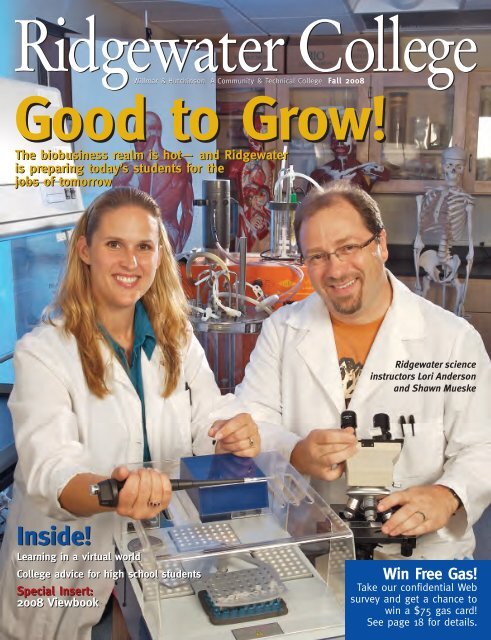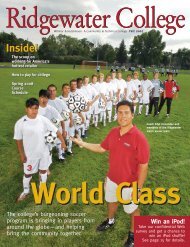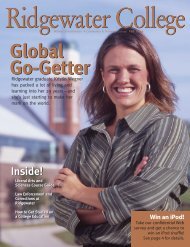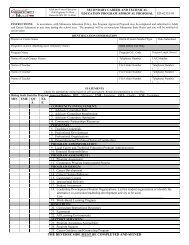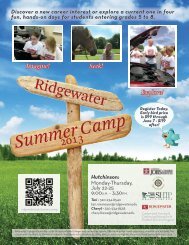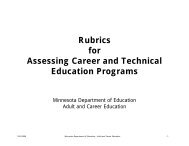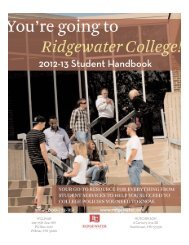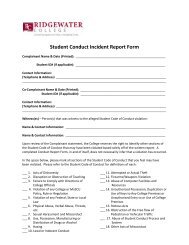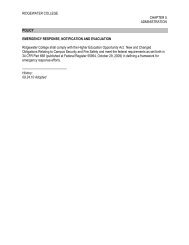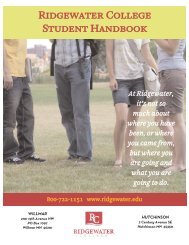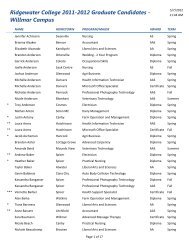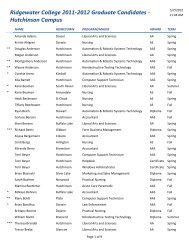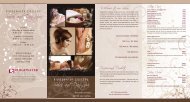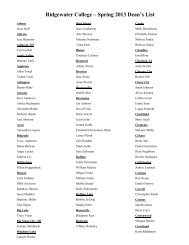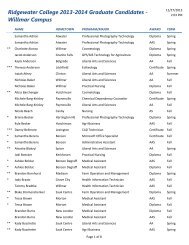RCMag_Final_F08 - Ridgewater College
RCMag_Final_F08 - Ridgewater College
RCMag_Final_F08 - Ridgewater College
Create successful ePaper yourself
Turn your PDF publications into a flip-book with our unique Google optimized e-Paper software.
<strong>Ridgewater</strong> <strong>College</strong><br />
Willmar & Hutchinson A Community & Technical <strong>College</strong> Fall 2008<br />
Good to Grow!<br />
The biobusiness realm is hot— and <strong>Ridgewater</strong><br />
is preparing today’s students for the<br />
jobs of tomorrow<br />
<strong>Ridgewater</strong> science<br />
instructors Lori Anderson<br />
and Shawn Mueske<br />
Inside!<br />
Learning in a virtual world<br />
<strong>College</strong> advice for high school students<br />
Special Insert:<br />
2008 Viewbook<br />
Win Free Gas!<br />
Take our confidential Web<br />
survey and get a chance to<br />
win a $75 gas card!<br />
See page 18 for details.
From the President<br />
These are unsettled times. Worldwide markets fluctuate daily, major businesses<br />
heretofore thought to be stable have gone under, governments struggle to figure<br />
out how to stabilize the economy, and we are in the process of choosing a<br />
new leader for our country. People are<br />
also nervous about their investments, and<br />
it’s easy to be discouraged. However, as<br />
one speaker I recently heard put it:<br />
Treading water is not a mode of travel.<br />
In this issue you’ll read about opportunities<br />
for students in the fields of bioscience<br />
and biotechnology; new partnerships<br />
with the University of Minnesota,<br />
St. Cloud State University, and local<br />
companies such as Life Science<br />
Innovations; the impact of virtual<br />
worlds on education; a decision to make<br />
our campuses healthier by going tobacco<br />
free; and the successful reaccreditation<br />
of our nursing programs. I hope you<br />
find the stories as inspiring and encouraging<br />
as I do.<br />
I also hope as you read about Dr. Scott<br />
Nyberg’s work as a transplant surgeon,<br />
Mark Klema’s work as a civil engineer, and Courtney Roering’s career in the pharmaceutical<br />
industry, that you will be as proud as I am of the quality educational opportunities<br />
that <strong>Ridgewater</strong> <strong>College</strong>’s faculty and staff have been providing for years.<br />
While we can’t predict how our financial investments will perform, it seems clear<br />
an investment in education pays dividends not just for the individual, but for society<br />
as a whole.<br />
Enjoy the magazine!<br />
Douglas W. Allen<br />
President<br />
MARTI CARLSON, CARLSON PHOTOGRAPHIC STUDIOS<br />
<strong>Ridgewater</strong> <strong>College</strong> is published for<br />
alumni and friends of <strong>Ridgewater</strong><br />
<strong>College</strong>, and for members of our<br />
surrounding communities.<br />
Please visit us on the Web at<br />
www.ridgewater.edu for more<br />
information on our programs and<br />
educational offerings.<br />
Executive Editor/Director of<br />
Communications and Marketing<br />
Sam Bowen<br />
Editor<br />
Chris Mikko<br />
Design<br />
Amy Bjellos<br />
Custom Publishing Services<br />
The Coghlan Group<br />
Contributing Writers<br />
Dan Heilman, Meleah Maynard,<br />
Evelyn Cottle Raedler, Mary Lahr<br />
Schier, Vicki Stavig, Liz Wolf<br />
Photography<br />
Marti Carlson, Patrick Kelly<br />
Advertising/Sponsorship Sales<br />
A variety of advertising and<br />
sponsorship options are available.<br />
For more information, contact<br />
Betsy Pierre, 952-903-0505, ext. 1;<br />
betsy@pierreproductions.com.<br />
Office of the President<br />
Dr. Douglas Allen<br />
© 2008 <strong>Ridgewater</strong> <strong>College</strong>.<br />
All rights reserved.<br />
Spring into Action!<br />
Registration for spring 2009 courses is underway at<br />
<strong>Ridgewater</strong>. You can find out more—and see the<br />
complete schedule at www.ridgewater.edu. Just click<br />
on “Course Schedules” on the left side of the home<br />
page.<br />
This publication is available in<br />
alternative formats upon request.<br />
<strong>Ridgewater</strong> <strong>College</strong> is an equal<br />
opportunity educator and employer.<br />
Mission Statement<br />
<strong>Ridgewater</strong> <strong>College</strong> provides quality<br />
learning opportunities for students in<br />
accessible, affordable, and supportive<br />
settings.<br />
<strong>Ridgewater</strong> <strong>College</strong> • Fall 2008 1
Table of<br />
Contents<br />
“The research you do today<br />
is the practice you’ll be<br />
doing 20 years from now.”<br />
Scott Nyberg, page 15<br />
“Students graduating from <strong>Ridgewater</strong> in<br />
the life sciences are going to be doing<br />
cutting-edge stuff that they might otherwise<br />
not do until graduate school or at a fouryear<br />
university.”<br />
—Shawn Mueske, page 13<br />
“It makes me feel really good if I can<br />
make somebody’s day by saving<br />
them money on a generic prescription<br />
or educating them about a drug they<br />
are taking.”<br />
Courtney Roering, page 23<br />
3<br />
4<br />
9<br />
10<br />
15<br />
19<br />
22<br />
Front Cover:<br />
<strong>Ridgewater</strong> instructors Lori Anderson and<br />
Shawn Mueske. Photo by Patrick Kelly.<br />
Fall 2008<br />
10 Questions<br />
Q&A with <strong>Ridgewater</strong> Administrative<br />
Support Instructor Judy Field.<br />
News & Notes<br />
<strong>Ridgewater</strong> ramps up its OSHA training<br />
efforts, the college goes tobaccofree,<br />
summer camps offer unique learning<br />
opportunities, and more.<br />
Practical Advice<br />
Eight steps to help high school juniors<br />
and seniors find and get into the right<br />
college for them.<br />
Cover Story<br />
Good to Grow<br />
Minnesota’s biotech sector is rich with<br />
economic potential and in need of<br />
workers with scientific skills.<br />
<strong>Ridgewater</strong> <strong>College</strong> is stepping up to<br />
meet the challenge.<br />
Feature Stories<br />
Singular Pursuit<br />
Mayo Clinic transplant surgeon and<br />
Willmar native Scott Nyberg is closing<br />
in on a long-held goal. The journey<br />
started at <strong>Ridgewater</strong> <strong>College</strong>.<br />
Brave New World<br />
A look at <strong>Ridgewater</strong>’s efforts to make<br />
online virtual-world learning an integral<br />
part of the classroom of the future.<br />
Graduate Profiles<br />
Mark Klema, Courtney Roering, and<br />
Nicholas Baker all used their<br />
<strong>Ridgewater</strong> educations to find fulfilling<br />
careers.<br />
2 www.ridgewater.edu
10 Questions<br />
<strong>Ridgewater</strong> Administrative Support Instructor<br />
Judy Field<br />
We recently visited with Judy Field, an instructor in the Administrative<br />
Support Department on <strong>Ridgewater</strong>’s Willmar campus. The Belview<br />
native was an adjunct instructor in the Business Department at<br />
<strong>Ridgewater</strong> (when it was still known as Willmar Community <strong>College</strong>) in<br />
the 1980s and early 1990s. After leaving to teach business at Willmar<br />
High School, she returned to <strong>Ridgewater</strong> in 2001 and has been a fixture<br />
in the college’s Administrative Support Department ever since.<br />
Today she teaches courses on everything from Microsoft Word, Excel,<br />
and Access to Administrative Office Procedures, Desktop Publishing,<br />
1<br />
2<br />
3. Is it your hope that many<br />
3<br />
of your students<br />
will go on to become executive assistants?<br />
That’s what we’re training our students to be. The skills they’re<br />
learning here are applicable to any office job. There are a lot of<br />
opportunities out there, especially in bigger cities. Our students<br />
can go into a wide range of businesses and industries, from<br />
churches to manufacturing. Every organization needs office staff.<br />
Our placement rate is between 95 and 97 percent.<br />
Advanced Word Processing, Project Management, Keyboarding, and<br />
Oral and Written Communications.<br />
1. What’s the difference between teaching high<br />
school students and college students?<br />
<strong>College</strong> students tend to be a little more serious about their learning,<br />
and they come with a focus. I enjoy how the nontraditional<br />
students come with work and life experiences that enhance the<br />
classroom discussions and make the learning more applicable.<br />
2. What skills do people need today in business?<br />
Communication skills are vital. People also need sharp written<br />
skills, strong computer skills, and strong interpersonal skills. We<br />
work with students in each of these areas.<br />
4. What business<br />
4<br />
degrees or diplomas<br />
5<br />
does your program offer?<br />
Depending on their goals and how in-depth they want their<br />
careers to be, students can choose from a range of 17 to 70 credits.<br />
In the Administrative Support Department, options include a<br />
17-credit Microsoft Office Specialist certificate; a 32-credit Office<br />
Assistant diploma; or a 48-credit diploma or 68- to 70-credit<br />
degree as an Administrative Assistant, Legal Administrative<br />
Assistant, or Healthcare Administrative Assistant. With the degree<br />
option, students can do an internship, which we strongly recommend.<br />
They gain experience and get their foot in the door. If they<br />
do well, they get a good recommendation. Some of our students<br />
have earned full-time positions as a result of their internships.<br />
5. What are the biggest challenges and rewards<br />
in teaching?<br />
The challenge is that our students are busy and juggling many<br />
things. We have single moms who are working in addition to<br />
going to school, for example. Our task is to maintain high standards.<br />
The reward is seeing students learn, grow, and gain confidence<br />
in themselves. It’s fun to see the light bulb go on when<br />
they catch on to something.<br />
6<br />
6. Do your former students stay in contact with you?<br />
Yesterday I got an e-mail from a student who graduated from our<br />
program a few years ago. When she started here, she had not<br />
graduated from high school, but earned her GED, got married,<br />
had a baby, and then came to <strong>Ridgewater</strong>. She wrote, ‘Thanks so<br />
much. I’m really enjoying working in an office. I’m thinking about<br />
going back to college, and I’m considering going into social<br />
work.’ She had gained confidence while she was at <strong>Ridgewater</strong><br />
and learned that she can do well and succeed.<br />
PATRICK KELLY<br />
78. How do you keep<br />
8<br />
up with changes in office<br />
7. What makes you good at what you do?<br />
I think it’s that I have compassion for students; I care about<br />
them. When I was in high school, I was an average student, but I<br />
had people who were great to me. I had wonderful opportunities<br />
and excellent teachers. What makes me come to work is thinking<br />
that I can help someone succeed. This isn’t just a job.<br />
99. If you hadn’t become<br />
10<br />
a teacher, what other career<br />
procedures and computer programs?<br />
I take classes. I got my master’s degree in the fall of 2006. I got<br />
my undergrad degree from St. Cloud State in business education<br />
with an emphasis on marketing management and got my master’s<br />
in management from the <strong>College</strong> of St. Scholastica. It was a<br />
dream of mine to do that. Now I can say to my students, “I’ve<br />
been there–I work, have a family, and went to grad school.”<br />
would you have chosen?<br />
In ninth grade, when I had to do a career plan, I said I was going<br />
to be an interpreter at the United Nations. I had taken French<br />
from grade school through high school and was going to take<br />
additional classes at St. Cloud State, but I didn’t pursue it.<br />
Teaching has served me well. It’s been a perfect match for me.<br />
10. What makes <strong>Ridgewater</strong> unique?<br />
We care about our students. They know they’re not just a number<br />
like they might be at big universities. Smaller class sizes enable<br />
students and teachers to have a good rapport. We know them, so<br />
when a call comes in for a job opening, we know who would be<br />
a good fit.<br />
—Vicki Stavig<br />
<strong>Ridgewater</strong> <strong>College</strong> • Fall 2008<br />
3
NEWS&NOTES<br />
Safety Matters<br />
<strong>Ridgewater</strong> ramps up its OSHA training offerings.<br />
Any business owner will tell you that<br />
keeping up with Occupational Safety and<br />
Health Administration (OSHA) regulations<br />
is no easy task. They also will tell<br />
you, however, that those regulations help<br />
prevent work-related injuries, illnesses,<br />
and deaths and, if implemented properly,<br />
drive down worker’s compensation rates,<br />
which has a direct impact on the bottom<br />
line.<br />
With those goals in mind, <strong>Ridgewater</strong><br />
has increased its course offerings to provide<br />
training to help area businesses<br />
ensure that they are complying with<br />
OSHA regulations. “We’ve experienced<br />
new growth in the OSHA area in the last<br />
six months, which made us realize there is<br />
a great demand for training by area businesses,”<br />
says Kathy Schwantes, dean of<br />
Customized Training and Continuing<br />
Education at <strong>Ridgewater</strong>.<br />
To keep up with those demands, the<br />
college also recently added to its staff,<br />
which now includes three OSHA experts:<br />
Bev Hartzburg, Dave Schutz, and Jill<br />
Gould.<br />
Custom-designed training<br />
After assessing a company’s needs,<br />
<strong>Ridgewater</strong>’s OSHA experts design and<br />
deliver the training program whenever<br />
and wherever the company desires. “We<br />
find out what their areas of concern are,”<br />
Schwantes says. “That might be a violation,<br />
or maybe their insurance company<br />
asked that they receive a certain type of<br />
training. Then we build a program that<br />
meets those needs and conduct the training<br />
on their site when it is convenient for<br />
them. We’re not just 8 to 5.”<br />
A recent addition to <strong>Ridgewater</strong>’s roster<br />
of OSHA training programs is respirator<br />
fit testing for people such as firefighters<br />
or auto body workers who must<br />
wear the devices while on the job to keep<br />
from breathing in smoke, dust particles,<br />
or fumes. The program addresses everything<br />
from use and maintenance to clean-<br />
ing and storage of respiratory<br />
protective<br />
equipment. It also<br />
includes a respirator fit<br />
test that ensures the<br />
mask size and model<br />
fits the face properly.<br />
“We received the<br />
quantitative fit testing<br />
equipment in August,”<br />
Schwantes says. “It’s<br />
an exciting enhancement<br />
to our program.<br />
That equipment allows<br />
the testing of all types<br />
of tight-fitting masks,<br />
including disposable<br />
Jill Gould<br />
half- and full-face<br />
masks, and provides an<br />
objective assessment of facial fit and a<br />
direct numerical result called a Fit Factor.”<br />
Industry-specific options<br />
<strong>Ridgewater</strong> also offers OSHA training<br />
targeted to specific industries such as construction,<br />
as well as a general course that<br />
addresses a variety of topics for general<br />
industry safety and health. Other course<br />
offerings include basic electrical, bloodborne<br />
pathogens, CPR, fall protection,<br />
recordkeeping requirements, scaffold erection,<br />
soil sampling, and trenching. The<br />
college also works with businesses to<br />
assist with OSHA audits and understanding<br />
regulations.<br />
The need for customized training programs<br />
such as OSHA is increasing, and<br />
<strong>Ridgewater</strong> is pleased that so many companies<br />
are turning to the college to provide<br />
it for them. “In fiscal year 2008,<br />
which ended June 30th, our department<br />
provided more than 80,000 hours of training<br />
to more than 14,000 students,”<br />
Schwantes says. “That includes OSHA.<br />
We’re seeing steady growth and have great<br />
expectations for 2009.”<br />
RIDGEWATER COLLEGE PHOTOGRAPHY DEPARTMENT<br />
—Vicki Stavig<br />
Meet Jill Gould<br />
Jill Gould joined <strong>Ridgewater</strong> in late<br />
September as a customized training<br />
representative and OSHA coordinator.<br />
With a master’s degree in Industrial<br />
Safety from the University of<br />
Minnesota-Duluth, and nearly 15 years<br />
of experience, she brings a high level<br />
of expertise to the job.<br />
“I was a safety investigator with<br />
Minnesota OSHA for 11 years and then<br />
spent three years as an occupational<br />
health and safety specialist with<br />
Affiliated Community Medical Centers<br />
in Willmar,” Gould says. “My experience<br />
in the private sector adds a<br />
dimension of understanding to employers’<br />
day-to-day challenges and industry<br />
trends in safety management.”<br />
Gould looks forward to working with<br />
<strong>Ridgewater</strong> clients. “Providing employees<br />
with safety training completes a<br />
circle of compliance and injury prevention<br />
that minimizes worker’s compensation<br />
costs and reduces premiums,” she<br />
says. “Most importantly, at the end of<br />
each day, employees leave work whole<br />
and healthy.”<br />
—V.S.<br />
4<br />
www.ridgewater.edu
NEWS&NOTES<br />
Making the<br />
Grade<br />
<strong>Ridgewater</strong>’s two-week<br />
Minnesota Manufacturing<br />
Camp event offered an innovative<br />
way for businesses to<br />
connect with a specialized<br />
segment of the workforce.<br />
Last June, <strong>Ridgewater</strong>’s Hutchinson campus<br />
was one of three sites around the<br />
state to host a Minnesota Manufacturing<br />
Camp. Designed for young adults at least<br />
16 years old with disabilities, the free<br />
camp offered a unique opportunity to<br />
explore high-wage manufacturing careers.<br />
The camp met for six hours per day,<br />
four days per week, from June 16 to 26 at<br />
<strong>Ridgewater</strong>’s Hutchinson campus.<br />
Hands-on learning made up a major part<br />
of the activities; participants created metal<br />
projects by cutting, grinding, and welding<br />
with industry equipment in a safe environment.<br />
They also got a first-hand look<br />
at manufacturing in action by touring<br />
area businesses in such realms as machining,<br />
metal and plastic processing, computerized<br />
machine operations and programming,<br />
tool and die making, and more.<br />
The Minnesota Manufacturing Camp<br />
program is sponsored by Pathways to<br />
Employment, an initiative made up of<br />
<strong>Ridgewater</strong> <strong>College</strong>, the Minnesota<br />
Department of Employment and<br />
Economic Development, the Minnesota<br />
Department of Human Services, Central<br />
Minnesota Jobs and Training Services,<br />
Minnesota State <strong>College</strong>s and<br />
Universities, the Minnesota Department<br />
of Education and its affiliated local school<br />
districts, and the University of<br />
Minnesota.<br />
For more information on the camps,<br />
contact Alyssa Klein of Pathways to<br />
Employment at 763-785-6497 or<br />
alyssa.klein@state.mn.us.<br />
—Sam Bowen<br />
RIDGEWATER FILE PHOTO<br />
A camp participant is instructed on use of the drill press.<br />
NON-DESTRUCTIVE ENGINEERING<br />
A Career to Build On<br />
Founded in 1957, Braun Intertec has grown into a national leader in engineering<br />
and environmental services. We have built a comprehensive scope of services in<br />
engineering and environmental consulting, materials and analytical laboratories,<br />
and testing services. We help our clients with site selection and planning, design,<br />
construction, operations and property management.<br />
We are seeking entry level and experienced NDE Technicians. Qualified entry level<br />
candidates will have an IRRSP card for industrial radiography, a minimum of a Level<br />
I (ASNT-TC-1A) guidelines in NDE methods which include magnetic particle, liquid<br />
penetrant, and ultrasonic, radiographic and visual inspections. Experienced candidates<br />
will have an IRRSP card for radiography, requires a minimum of Level II (ASNT-TC-1A)<br />
guidelines in methods of radiography, magetic particle, liquid penetrant, ultrasonics,<br />
and visual. AWS certified welding certification and UBC special inspection certification<br />
for structural steel and/or ASNT Level III certifications preferred. All candidates should<br />
have excellent communication skills and PC proficiency for preparation of reports and<br />
documentation.<br />
Braun Intertec offers an employee-centered culture with competitive salaries and<br />
benefits and great potential for career growth and development. Learn more about the<br />
company by visiting our website:<br />
www.braunintertec.com<br />
Please send your letter of interest and resume<br />
via email to: jobs@braunintertec.com<br />
Braun Intertec, Human Resources,<br />
11001 Hampshire Ave South,<br />
Minneapolis, MN 55438<br />
EEO/AA<br />
Drug Free Workplace<br />
<strong>Ridgewater</strong> <strong>College</strong> • Fall 2008 5
NEWS&NOTES<br />
Tobacco-Free Zone<br />
<strong>Ridgewater</strong> announces a new policy on tobacco, along with<br />
programs for students looking to quit.<br />
It’s official: <strong>Ridgewater</strong> is now officially a tobacco-free zone. At the start<br />
of the Fall 2008 semester, the college joined other higher education<br />
institutions in Minnesota by implementing a no-tobacco policy on its<br />
Willmar and Hutchinson campuses.<br />
While the college’s new policy is not an attempt to force students or<br />
employees to quit using tobacco products, it is asking them to<br />
refrain from doing so in buildings and on college property. “This policy<br />
change was driven by a number of factors, but primarily by the desire to<br />
provide a healthy environment for our students, employees, and visitors,” says<br />
<strong>Ridgewater</strong> President Douglas Allen. “As an institution of higher education, we believe<br />
we have a responsibility to take a leadership role on this major health issue, and<br />
allowing tobacco product use on our campuses runs counter to that educational mission.”<br />
Over the coming months, the college also will be working with its staff and local medical<br />
professionals to develop and offer programs for employees and students who<br />
choose to quit using tobacco products or who need assistance in coping with the<br />
change.<br />
—Sam Bowen<br />
Stephanie grew up in Marshall, Minnesota, but her medical<br />
career has taken her to Iowa, Michigan, Hawaii and Illinois.<br />
Now she’s glad to be back. And we’re glad she chose ACMC.<br />
Stephanie says, “If you like being part of a close community,<br />
want a safe and fun atmosphere for your family, and want to<br />
really know your patients, then ACMC in southwest Minnesota<br />
is a great place tobe a Physician Assistant!”<br />
Affiliated Community Medical Centers is the largest, fastestgrowing<br />
multi-specialty health network in outstate Minnesota.<br />
ACMC currently has exciting practice opportunities for<br />
Physician Assistants and Nurse Practitioners at many<br />
of our eleven clinic locations. Call or go online today!<br />
Kari Bredberg, Physician Recruitment<br />
(320) 231-6366 | karib@acmc.com<br />
101 Willmar Avenue SW, Willmar, MN 56201 | www.acmc.com<br />
26<br />
www.ridgewater.edu
Happy Campers<br />
<strong>Ridgewater</strong>’s summer day camp program offers participants hands-on fun, learning,<br />
and a chance to start thinking about their futures.<br />
Many parents will tell you that enticing<br />
children to enroll in summer learning programs<br />
is no easy task. The parents of some<br />
100 children in Willmar and Hutchinson,<br />
however, are singing a different tune. Their<br />
children enjoyed the learning experiences<br />
they had during <strong>Ridgewater</strong> <strong>College</strong>’s<br />
Summer Camp so much that they were<br />
begging for more.<br />
The key to their enthusiasm: an extensive<br />
and eclectic mix of classes, all geared<br />
to exposing fifth- through eighth-grade<br />
students to options they will have as they<br />
continue their educations and decide what<br />
they want to do with their lives. “The<br />
camp provides students with a way to<br />
begin thinking about college and their<br />
future careers,” says Tari Niemeyer, program<br />
manager for the college’s Center of<br />
Customized and Continuing Education.<br />
“They students are full of enthusiasm and<br />
don’t want to leave when the camp ends.”<br />
NEWS&NOTES<br />
Hands-on learning<br />
And why would they? The hands-on curriculum exposes them to everything<br />
from auto mechanics, fireworks, acting, canoeing, and veterinary medicine to<br />
cooking, photography, robotics, digital photography, and crime scene investigation.<br />
Classes are taught by <strong>Ridgewater</strong> faculty and staff and by people from the<br />
community who are experts in their fields. Members of the University of<br />
Minnesota 4H Club and the Minnesota Workforce Center’s youth program in<br />
Hutchinson also worked with campers on team building and leadership skills.<br />
“This past summer was the fifth year of the program on the Willmar campus<br />
and the fourth on the Hutchinson campus,” Niemeyer says. “The camp runs<br />
for four days on each campus, from 9 a.m. to 3:30 p.m., Monday through<br />
Thursday.”<br />
<strong>Ridgewater</strong>’s 2009 Summer Camp is set for July 27-30 on the Willmar campus,<br />
and July 20-23 on the Hutchinson campus. New this year, the camps will be<br />
open for students who have completed grades 4, 5, 6, or 7. For more information<br />
on the camp, contact Tari Niemeyer at tari.niemeyer@ridgewater.edu.<br />
Scholarships are also available through the <strong>Ridgewater</strong> <strong>College</strong> Foundation and<br />
the West Central Integration Collaborative.<br />
—Vicki Stavig<br />
RIDGEWATER FILE PHOTO<br />
A pair of camp participants work on building<br />
a Lego robot.<br />
<strong>Ridgewater</strong> <strong>College</strong> • Fall 2008<br />
7
NEWS&NOTES<br />
The Right Stuff<br />
<strong>Ridgewater</strong>’s Nursing programs earn accreditation from a prestigious national organization.<br />
The National League for Nursing<br />
Accrediting Commission (NLNAC) has<br />
granted <strong>Ridgewater</strong>’s associate degree<br />
Nursing and Practical Nursing programs<br />
continuing accreditation. By meeting all<br />
conditions of accreditation, <strong>Ridgewater</strong><br />
will maintain this status through the next<br />
review, which will take place in 2016.<br />
NLNAC accreditation is a voluntary, selfregulatory<br />
process that independently<br />
evaluates nursing programs against the<br />
highest national standards of educational<br />
quality. The accreditation process itself<br />
focuses on seven core components: mission<br />
and governance, faculty, students,<br />
curriculum and instruction, resources,<br />
integrity, and educational effectiveness. It<br />
also helps the college focus on continuous<br />
improvement by illustrating areas that<br />
need further development and fostering<br />
self-examination.<br />
“The greatest benefit of accreditation is to<br />
our students,” says Lynn Johnson,<br />
<strong>Ridgewater</strong>’s director of Nursing. “It helps<br />
lessen barriers when they elect to<br />
advance their degrees. Because it is a<br />
peer-review process, other institutions<br />
and programs recognize that NLNACaccredited<br />
programs have taken the extra<br />
step to strengthen educational quality.<br />
Therefore, our investment in continued<br />
accreditation for our nursing programs<br />
fosters educational access and mobility<br />
for our graduates. In addition, there are<br />
health care institutions/systems that will<br />
only hire graduates of accredited programs,<br />
adding further value to our graduates<br />
through broad access to employment<br />
opportunities.”<br />
For more information on <strong>Ridgewater</strong>’s<br />
Nursing program, go to<br />
www.ridgewater.edu, click on “Future<br />
Students” and then on “Nursing” in the<br />
drop-down menu.<br />
—Sam Bowen<br />
Attention <strong>Ridgewater</strong> Alumni!<br />
We want to keep in touch with you.<br />
The <strong>Ridgewater</strong> <strong>College</strong> Foundation is trying to<br />
locate as many of its former students and<br />
graduates (alumni) as possible. If you attended<br />
and/or graduated from <strong>Ridgewater</strong> <strong>College</strong>—or<br />
Willmar Technical <strong>College</strong>, Willmar Community<br />
<strong>College</strong>, or Hutchinson Technical <strong>College</strong> at any<br />
time before these colleges merged—WE WANT<br />
TO HEAR FROM YOU! Please go online to complete<br />
our Alumni Profile Update form at<br />
www.ridgewater.edu, then click on “<strong>College</strong><br />
Foundation and Alumni.” Or take a few<br />
moments now to complete the form provided<br />
here and mail it to:<br />
<strong>Ridgewater</strong> <strong>College</strong> Foundation<br />
P.O. Box 1097<br />
Willmar, MN 56201<br />
The information you provide on this form (with<br />
the exception of DOB and SSN) may be made<br />
available to classmates planning reunions or<br />
just wanting to stay in touch. <strong>Ridgewater</strong><br />
<strong>College</strong> and the <strong>Ridgewater</strong> <strong>College</strong> Foundation<br />
will also use the information to keep you<br />
informed of special events and opportunities at<br />
the college. We are excited to connect with you<br />
and tell you about the great things happening<br />
at your alma mater!<br />
Alumni Profile Update Form<br />
First: _______________ Middle: _________ Last: ___________________ Maiden:______________<br />
Address: ___________________________________________________________________________<br />
City: ______________________ State: _______ Zip: __________ Phone: _____________________<br />
DOB*: ___________ SSN*: _________________ E-mail: ____________________________________<br />
* DOB and SSN information will be kept confidential. Be advised that you are not required under state/federal law to<br />
provide this information to us; however, it does help us identify you in our alumni database if you choose to provide it.<br />
Dates you attended <strong>Ridgewater</strong> (or predecessor): ________________________________________<br />
Program Attended: ____________________________________ Dates Attended: _______________<br />
Degree Obtained: Diploma Certificate AAS Other Year Graduated: _______________<br />
Current Employer: ______________________________ City/State: ___________________________<br />
Job Title: __________________________________________ Work Phone: _____________________<br />
Spouse’s Name: ____________________ Did Spouse attend <strong>Ridgewater</strong> (or predecessor)? Y<br />
(If Yes):<br />
Program Attended: ____________________________________ Dates Attended: _______________<br />
Year Graduated: _________________ Degree Obtained: Diploma Certificate AAS Other<br />
Spouse’s Employer: _____________________________ City/State: ___________________________<br />
Spouse Job Title: ___________________________________ Work Phone: _____________________<br />
N<br />
8<br />
www.ridgewater.edu
PRACTICAL advice<br />
A Simple Plan<br />
Attention high school juniors and seniors! Here are eight steps<br />
to help you and your parents find and get into the college<br />
of your choice.<br />
As most high school students know, junior and senior years are the time<br />
to make big decisions about your post-secondary future. With that in<br />
mind, here’s a list of sensible steps to help you through this exciting but<br />
sometimes overwhelming process.<br />
Step #1: Answer the big questions<br />
If you haven’t already, make a list of the colleges you’re interested<br />
in attending and programs/majors you may want to study. While<br />
doing so, keep in mind your answers to the following questions:<br />
• Do you want to attend a large university, a small college, or a<br />
technical college?<br />
• How do you plan to pay for your education?<br />
• Do you want to live on campus or commute?<br />
Step #2: Talk it over<br />
Now’s the time to make an appointment with your high school<br />
guidance counselor and discuss what you want from a college. Your<br />
counselor may be able to make good recommendations and help<br />
you find schools with programs and majors that interest you.<br />
Step #3: Schedule campus visits<br />
“You will never know if a college ‘feels’ right until you actually visit<br />
the campus,” says Matt Gustafson, a counselor on <strong>Ridgewater</strong>’s<br />
Willmar campus, noting that you should visit several colleges as<br />
part of your search process.<br />
Gustafson also suggests meeting with admissions representatives<br />
to learn about the cost, admissions process and deadlines, financial<br />
aid, and scholarship deadlines. Ask key questions about:<br />
• class size<br />
• ratio of instructors to students<br />
• campus resources<br />
• job placement rates for technical programs<br />
• housing options.<br />
Step #4: Make a list, check it twice<br />
You can maximize the value of your campus visits by using the<br />
following checklist as a guideline:<br />
• I feel comfortable here.<br />
• The school has the academic programs I want.<br />
• I believe I could get a job in my field with a degree<br />
from this school.<br />
• I like the size of this college.<br />
• I like where it’s located.<br />
Step #5: Beef up your test scores<br />
You may already have taken the ACT and SAT and received your<br />
scores, but there’s still time to improve them by taking the tests<br />
again. While most two-year colleges don’t require the SAT or ACT,<br />
they’re necessary for students wanting to start their degrees at<br />
four-year colleges.<br />
Step #6: Write to the point<br />
Some colleges require a letter of recommendation, so speak with a<br />
favorite teacher, advisor, coach, or employer and ask if he or she<br />
will write one for you. Keep in mind that some schools require a<br />
college admissions essay.<br />
Step #7: Check out financial aid options<br />
Begin researching ways to pay for school (scholarships, financial<br />
aid, etc.). You and your parents need to complete your income tax<br />
forms as soon as possible after January 1 of your senior year, as<br />
you need those figures to fill out the Free Application for Financial<br />
Student Aid form. (For more detailed information on financial aid,<br />
go to www.ridgewater.edu, click on “Future Students” and then on<br />
“Financial Aid” in the drop-down menu.)<br />
Step #8: Talk it over and get to work<br />
Talk with your parents about which schools they would like you to<br />
consider, narrow down your list, and begin filling out applications.<br />
There’s no rule about how many schools you can apply to. Seniors<br />
typically mail their applications in fall or winter. Applying early has<br />
its advantages, Gustafson points out. “Popular technical programs<br />
at <strong>Ridgewater</strong>, for example, fill up quickly,” he says. “Some might<br />
require that students apply in early September for the following<br />
school year.”<br />
To apply to <strong>Ridgewater</strong>, all you need is an application form, a<br />
$20 application fee, and your high school transcript (or GED certificate).<br />
To find out more, go to www.ridgewater.edu, click on “Future<br />
Students” and then on “Admissions” in the drop-down menu.<br />
Once you are admitted to college, you may be required to take<br />
placement tests, attend orientation sessions, etc., so it’s important<br />
to stay in communication with your chosen school before you even<br />
step foot on campus as a freshman.<br />
Gustafson suggests that students be involved throughout the<br />
entire process with their parents’ guidance. “Choosing a college is<br />
one of the most important decisions you will make, so do as much<br />
research as possible and be involved in every step,” he says.<br />
Keep in mind, he adds, that the goal is to find a college that<br />
suits you and provides an environment where you can flourish. The<br />
process can be overwhelming, but relax: You’ve been preparing for<br />
this for the past couple of years. “It’s also important to know<br />
there’s help,” Gustafson says. “We’re here to help students make a<br />
successful transition from high school to college.”<br />
To schedule a visit at <strong>Ridgewater</strong> <strong>College</strong>, call 800-722-1151. Or<br />
visit www.ridgewater.edu and click on the “Future Students” link.<br />
—Liz Wolf<br />
<strong>Ridgewater</strong> <strong>College</strong> • Fall 2008<br />
9
Good TO Grow<br />
Minnesota’s biotech sector is<br />
rich with economic potential<br />
and in need of workers with<br />
scientific skills. <strong>Ridgewater</strong><br />
<strong>College</strong> is stepping up to meet<br />
the challenge.<br />
By Mary Lahr Schier<br />
The 21st Century has often been<br />
described as the Age of Biology—a time<br />
when scientists’ growing knowledge of<br />
living organisms will lead to huge<br />
advances in medicine, agriculture, environmental<br />
science, and technology. It’s<br />
an era that demands scientifically literate<br />
citizens and workers with top-notch<br />
training.<br />
Minnesota’s long history as a leader in<br />
the medical device industry—the world’s<br />
first pacemaker was developed here in<br />
the late 1950s—makes the state particularly<br />
primed to grow biotech businesses.<br />
One state study indicates that<br />
Minnesota is 24 percent more dependent<br />
on biotech businesses than other<br />
states. That’s not a bad thing, though.<br />
On average, workers in the biobusiness<br />
realm earn wages more than one-and-ahalf<br />
times higher than other private<br />
enterprise workers. And every job in<br />
biobusiness generates nearly six other<br />
jobs. To remain competitive in this<br />
important sector, however, the state<br />
“needs to make sure the workforce is<br />
there,” says Jenni Swenson, dean of<br />
instruction at <strong>Ridgewater</strong> <strong>College</strong>.<br />
As Swenson adds, part of that workforce<br />
will be trained at <strong>Ridgewater</strong>. In<br />
the past year, the college has revised<br />
degree programs, formed new partnerships,<br />
purchased new equipment, and<br />
expanded its focus on working with<br />
local companies to improve its ability to<br />
train workers for biobusiness. Here’s a<br />
look at these efforts—which have<br />
attracted significant funding from the<br />
state to carry them out and which are<br />
positioning the college and the region<br />
to prosper for decades to come.<br />
Lori Anderson and<br />
Shawn Mueske<br />
10<br />
www.ridgewater.edu
One-Stop Shop<br />
When complete, <strong>Ridgewater</strong>’s Biobusiness Clearinghouse will offer<br />
a powerful resource for area biotech businesses and educators.<br />
As biobusinesses grow in Minnesota, the need for collaboration and knowledge sharing among companies<br />
and educational institutions is increasing. Pulling together the resources of education and the needs of<br />
business will be a primary focus of the new Biobusiness Clearinghouse to be located at <strong>Ridgewater</strong><br />
<strong>College</strong>.<br />
Funded with a $375,000 grant from the Minnesota State <strong>College</strong>s and Universities system (MnSCU),<br />
the clearinghouse will be a “one-stop shop,” for businesses and educators, according to Lori Anderson, a<br />
<strong>Ridgewater</strong> biology instructor who is involved in developing the clearinghouse. The clearinghouse will<br />
include links to a variety of resources for those teaching biology and working in bio-based businesses,<br />
such as notices of conferences, professional development and internship opportunities, educational materials,<br />
and networking events.<br />
It also will be a repository for a wide range of experiments and lessons that organizations can use to<br />
increase knowledge of workers and students on biotechnology issues. Learning object repositories, as<br />
they are called, are powerful tools for spreading information because they bring together resources from a<br />
wide area, says Jenni Swenson, dean of instruction at <strong>Ridgewater</strong>, who helped set up learning object<br />
repositories in a previous position at the University of Minnesota. The learning objects are all discrete,<br />
reusable, and digital, and users can easily search the repository to find the material they need. “A learning<br />
object can be anything that can be used in a classroom,” Swenson says. “It could be a PowerPoint presentation,<br />
an important picture, a crossword puzzle for high school students, video clips that show a process,<br />
or a laboratory experiment with complete instructions. The clearinghouse will eventually have vast<br />
resources that anyone in Minnesota can use.”<br />
Setting up the clearinghouse will be a multi-year process because it involves not only collecting the<br />
learning objects, but making sure that they have been reviewed by experts in the field and that they can be<br />
made available without violating copyright or intellectual property laws. The Biobusiness Clearinghouse<br />
is expected to go online in 2010, says Anderson, although the project will not be completed for at least<br />
three years.<br />
For more information on the Biobusiness Clearinghouse, contact Jenni Swenson at 320-222-5204,<br />
jenni.swenson@ridgewater.edu.<br />
On the Cutting Edge<br />
Sophisticated new lab facilities are opening new doors<br />
for <strong>Ridgewater</strong> biology students.<br />
PATRICK KELLY<br />
When students step into <strong>Ridgewater</strong>’s biology laboratories, they are entering a world far more advanced<br />
than the familiar realm of beaker tubes and slide smears. A host of new equipment that has been purchased<br />
by and donated to the college is allowing students to perform advanced experiments and training<br />
them on state-of-the-art tools similar to what is used in today’s biobusiness industry.<br />
“The growth in biotechnology has been coming for a long time,” says Shawn Mueske, a <strong>Ridgewater</strong> science<br />
instructor who has been involved in redesigning the college’s biology programs. “Students graduating<br />
from <strong>Ridgewater</strong> in the life sciences will be doing cutting-edge stuff that they might not otherwise do<br />
until graduate school or at a four-year university.”<br />
In addition to enhancing biology classes, the new equipment will be used by students studying forensics,<br />
agriculture, and environmental science, says Mueske. The equipment gives <strong>Ridgewater</strong> students the<br />
opportunity to develop expertise on machines they are likely to encounter in biotech industry jobs. For<br />
instance, Willmar-based Epitopix, which develops and manufactures vaccines for use in the veterinary<br />
field, recently donated a fermenter to the college. Fermenters are used to grow microorganisms under<br />
<strong>Ridgewater</strong> <strong>College</strong> • Fall 2008 11
“Students graduating from <strong>Ridgewater</strong> in the life<br />
sciences will be doing cutting-edge stuff that they<br />
might not otherwise do until graduate school or at<br />
a four-year university.”<br />
—Shawn Mueske<br />
controlled conditions and are key to biotech processes such as ethanol manufacturing.<br />
Another example: Through connections with Bushmills Ethanol in Atwater,<br />
<strong>Ridgewater</strong> science instructors are developing a laboratory exercise during which<br />
students will make ethanol, just as it is done at Bushmills. “We’re basically taking<br />
their design and replicating it for a college classroom,” says Mueske.<br />
Another new piece of equipment in the lab is a polymerase chain reactor, which<br />
allows students to replicate DNA via a process used in forensics and other biotechrelated<br />
fields. The college also recently purchased an electrophoresis unit, which is<br />
used in cell biology to separate molecules and study molecular genetics.<br />
The purchases are part of an ongoing initiative. <strong>Ridgewater</strong>’s laboratories were<br />
renovated about five years ago, and several pieces of equipment were added then,<br />
including laminar flow hoods, which allow students to safely work with microbes<br />
and other organisms that could be dangerous if airborne, and autoclaves, which are<br />
used to sterilize lab equipment. Having experience on up-to-date equipment not<br />
only helps students when they move to four-year institutions to complete a bachelor’s<br />
degree, but also gives an edge in the job market to those students who move<br />
from <strong>Ridgewater</strong> to full-time work, says Mueske.<br />
Partners in Progress<br />
An innovative partnership between <strong>Ridgewater</strong> and St. Cloud<br />
State University is creating a host of new opportunities for<br />
biology-minded students.<br />
Students interested in pursuing an associate’s degree in biology at <strong>Ridgewater</strong> in the<br />
future will encounter a more rigorous curriculum and a guarantee of acceptance to<br />
St. Cloud State University’s (SCSU) biology program, if they successfully complete<br />
the program.<br />
As part of its efforts to strengthen bioscience programs at <strong>Ridgewater</strong>, the college<br />
is negotiating a partnership with SCSU to coordinate introductory courses for biology<br />
majors and smooth the transition of <strong>Ridgewater</strong> graduates into the programs at<br />
SCSU. Instructor Shawn Mueske designed the new program during a recent sabbatical<br />
from teaching. He worked with area biotech firms to determine the kinds of<br />
skills future employees would need. “The companies had a whole litany of skills<br />
they were looking for,” Mueske says. “A lot of the labs we have are designed<br />
around these local needs.”<br />
In the new curriculum, students will take year-long courses in biology and chemistry<br />
during their first year at <strong>Ridgewater</strong>. They also will take courses in organic<br />
chemistry and microbiology, as well as required courses in communications and<br />
math. The new curriculum also includes a class entitled Introduction to Bioscience<br />
Technology, which Mueske considers a “flagship course to get people interested in<br />
biotechnology.” Other courses will be offered in areas such as biotech regulation.<br />
For students who may not be interested in pursuing a bachelor’s degree through<br />
SCSU, <strong>Ridgewater</strong> faculty are working to develop a third-year option, says<br />
Mueske. This option would require an additional year at <strong>Ridgewater</strong>, more coursework,<br />
and an internship at a local biotech company. A timeline for that program has<br />
not been determined yet.<br />
12<br />
www.ridgewater.edu
“Many scientists are sick of the rat race in metro<br />
areas. Here they can have a more reasonable<br />
commute and a more holistic lifestyle.”<br />
—Chris Huisinga<br />
Homegrown High Tech<br />
Willmar-based LSI created the MinnWest Technology<br />
Campus. Now it’s working with <strong>Ridgewater</strong> to address<br />
growing biotech workforce needs.<br />
Chris Huisinga is a <strong>Ridgewater</strong> graduate who wanted to stay in the area. After<br />
earning an associate’s degree from <strong>Ridgewater</strong>, he graduated from the University of<br />
St. Thomas and asked for a job at Life Science Innovations (LSI), a Willmar-based<br />
firm that his family runs. He was gently told to go prove himself elsewhere.<br />
He did just that, going to work for Wells Fargo for much of the next decade.<br />
Eventually, he made his way back to the family business. “This is probably the<br />
most anti-nepotism company anywhere,” says Huisinga, who now works as director<br />
of business development for LSI, which is a holding company for 14 businesses<br />
that all sprang from his great-grandfather’s turkey hatchery, Willmar Poultry Inc.<br />
“This company has always done a lot of research and development, and some of the<br />
ideas that came from that were so good that they became companies.”<br />
While the family firm may be anti-nepotism, it is pro-Willmar and its surrounding<br />
areas. In 2005, while looking for additional space for two of its companies, LSI<br />
executives toured the old Willmar State Hospital property, which consisted of 110<br />
acres with more than 500,000 square feet of space overlooking Willmar Lake. Local<br />
officials were hoping to redevelop the property, which had been closed by the state.<br />
“Fortunately, our leadership could see through the cracked paint to the potential of<br />
the property,” says Huisinga.<br />
Now called the MinnWest Technology Campus, the property is home to 14 companies,<br />
including LSI subsidiaries Willmar Poultry, the country’s largest turkey<br />
hatchery; Epitopix, a supplier of veterinary medicines; and Midwest Data, a diversified<br />
communications company with expertise in custom billing. Other organizations<br />
on the campus include agricultural technology businesses, marketing and<br />
design firms, and legal assistants. MinnWest recently signed an agreement with the<br />
University of Minnesota to open a research and outreach branch on the campus,<br />
and technology companies from as far as Seattle have considered moving to the site.<br />
For leaders of these high-tech organizations, the region offers both personal and<br />
business benefits. “Many scientists are sick of the rat race in metro areas,” says<br />
Huisinga, who lived in Minneapolis, San Francisco, and south Florida before moving<br />
back to Willmar. “Here they can have a more reasonable commute and a more<br />
holistic lifestyle.”<br />
In addition, the location on a campus with other businesses in similar industries<br />
provides tangible and intangible benefits. LSI has invested about $10 million in the<br />
project to bring the historic buildings to the standard necessary for technology<br />
businesses. Companies on the campus share a cafeteria, a day-care center, an auditorium,<br />
and an exercise area with a pool. In addition, being located near other technology<br />
businesses encourages collaborations among firms and a cross-pollination of<br />
ideas, says Huisinga, who adds that he believes the campus and its critical mass of<br />
technology companies will attract even more tech talent to the area.<br />
Workforce development<br />
Another key draw for LSI and the other businesses is the steady development of a<br />
workforce that will enable them to continue to produce and fill jobs as the biotech<br />
<strong>Ridgewater</strong> <strong>College</strong> • Fall 2008 13
“We want students to be<br />
excited about the opportunities<br />
available to them<br />
in their hometown.”<br />
— Chris Huisinga<br />
industry grows over the next several<br />
decades. Partnerships with <strong>Ridgewater</strong><br />
and other MnSCU institutions are part<br />
of that growth plan and may include<br />
having a classroom on the campus, having<br />
<strong>Ridgewater</strong> provide custom training<br />
for companies based on the campus,<br />
greater internship opportunities for<br />
<strong>Ridgewater</strong> students, and increased outreach<br />
to area high school students. “We<br />
want students to be excited about the<br />
opportunities available to them in their<br />
hometown,” says Huisinga.<br />
While specifics of the partnership with<br />
<strong>Ridgewater</strong> have yet to be worked out,<br />
LSI executives have been “extremely<br />
supportive of us,” says Swenson.<br />
“Because they have workforce needs, we<br />
are trying to figure out what we can do<br />
to assist them. With businesses growing<br />
there as fast as they are, they will need<br />
the numbers of students. It’s a great<br />
partnership.”<br />
Mary Lahr Schier is a Northfield-based<br />
writer.<br />
Biological Sciences at<br />
<strong>Ridgewater</strong><br />
<strong>Ridgewater</strong> 64-credit Biology A.S.<br />
degree program is designed for students<br />
interested in such fields as<br />
cell biology, environmental science,<br />
fish and wildlife management,<br />
forestry, genetics, and microbiology.<br />
For more information, go to<br />
www.ridgewater.edu, click on<br />
“Programs and Courses,” and then<br />
click on “Biological Sciences.”<br />
14<br />
www.ridgewatermag.com
Singular<br />
Pursuit<br />
Dr. Scott Nyberg<br />
PATRICK KELLY<br />
After years of schooling, training, and research,<br />
Mayo Clinic transplant surgeon and Willmar native<br />
Scott Nyberg is closing in on a long-held goal. The<br />
journey started at <strong>Ridgewater</strong> <strong>College</strong>.<br />
BY MELEAH MAYNARD<br />
Ask Scott Nyberg what inspired him to become a<br />
surgeon and you’ll get an answer that you probably<br />
weren’t expecting: golf. As a boy, growing up in<br />
Willmar, he got to know a local surgeon who lived a<br />
few doors down. The doctor, who was well respected<br />
in the community, was very busy. But he always<br />
had time to play golf. “I remember thinking to<br />
<strong>Ridgewater</strong> <strong>College</strong> • Fall 2008<br />
15
myself,” says Nyberg, “if he could do his job and have time to golf like that, I wanted<br />
that job, too.”<br />
Fast forward to today. Not only is Nyberg is a good golfer, he’s also a transplant<br />
surgeon at the Mayo Clinic in Rochester and a professor of surgery in Mayo’s medical<br />
school. He is also chair of surgical research and director of the Mayo Liver<br />
Support Laboratory. Founded by Nyberg in 1996, the laboratory is funded by the<br />
National Institute of Health and develops support devices for patients with liver<br />
failure and sepsis.<br />
While he clearly enjoys all of his work, Nyberg describes his research in the lab as<br />
the culmination of a dream that began with a comment a teacher made when he was<br />
a high school senior taking classes at <strong>Ridgewater</strong> <strong>College</strong> (then known as Willmar<br />
Community <strong>College</strong>) in 1977. This was long before the Post-Secondary Enrollment<br />
Option program allowed high school students to take college-level classes. So<br />
Nyberg and his teachers had to make a good case for why he should be allowed to<br />
attend community college since so few students were doing so at the time. “I<br />
remember I got in and my first year’s tuition was even covered by a scholarship<br />
from the Women’s Auxiliary,” he recalls.<br />
After attending his high school classes in the morning Nyberg, who also participated<br />
in swimming, football, and golf, would head to <strong>Ridgewater</strong> to take courses in<br />
Artificial Reality<br />
Scott Nyberg’s work on a bioartificial liver appears to be<br />
on the edge of a major breakthrough.<br />
Scott Nyberg describes the artificial liver he’s invented as a kind of dialysis<br />
system that treats liver disease. “But it’s more complicated than simple dialysis,<br />
which separates waste molecules based on their size,” he explains, noting<br />
that the device actually grows liver cells. “You’ve heard of growing cells in Petri<br />
dishes. Well, we scale everything up so we have a bioartificial liver.”<br />
There have been other, unsuccessful attempts to create liver support devices in<br />
the past. Some used pig liver cells. Others tried human tumor cells. After nearly<br />
20 years of research and development, Nyberg, who uses stem cells in his<br />
lab, is sure the device will work. But there are many more hurdles to cross<br />
before it becomes available to patients, including clinical trials and U.S. Food<br />
and Drug Administration (FDA) reviews.<br />
Once realized, the artificial liver, on which Mayo holds the patent, will likely be<br />
a lifesaver for two different types of recipients, Nyberg says. In the first group<br />
are the 50,000 to 100,000 people who develop liver failure over a period of<br />
years, requiring a liver transplant. The second group includes the 5,000 or so<br />
individuals in the United States who overdose on acetaminophen each year,<br />
develop acute liver failure, and need a liver transplant.<br />
The device could help bridge the gap for this latter group while they’re waiting<br />
on the transplant list. “It all depends on how severely the person’s liver is<br />
injured,” he says. “The liver gets rid of waste products. If those products accumulate,<br />
your brain swells and you can go into a coma. This device helps<br />
detoxify the blood molecules that simple dialysis can’t remove.”<br />
If all goes well, Nyberg hopes to begin FDA-approved trials of his artificial liver<br />
in 2009. “It’s really exciting,” he says. “This is what I’ve been dreaming of and<br />
living for.”<br />
—M.M.<br />
the afternoon. Though he excelled in<br />
science and math, he wasn’t sure what<br />
he wanted to study in college. He talked<br />
about this with his <strong>Ridgewater</strong> chemistry<br />
instructor, who told him “that I<br />
needed to do something with my life,<br />
something meaningful.” Nyberg says. “I<br />
thought a lot about that.”<br />
Steps along the way<br />
It was Nyberg’s high school math and<br />
science teachers who suggested he<br />
attend <strong>Ridgewater</strong> <strong>College</strong>. A straight-A<br />
student, he was also a member of the<br />
school’s math team, which regularly<br />
competed in and won state contests.<br />
<strong>Ridgewater</strong>, the teachers reasoned,<br />
would help bolster Nyberg’s learning<br />
before he went on to a four-year college.<br />
They were right. “The instruction there<br />
came straight from the teacher who<br />
knew it best,” he says. “There was a lot<br />
of one-on-one time.”<br />
Nyberg was valedictorian of his high<br />
school class in 1978. After high school,<br />
he studied at <strong>Ridgewater</strong> for a year as<br />
part of a pre-engineering group. The<br />
students took all of their classes together<br />
and spent long days working on projects.<br />
“We were all pretty close,” Nyberg<br />
remembers. “The whole experience was<br />
a good transition for me, and I had<br />
access to classes that I wouldn’t have<br />
access to otherwise because [Willmar’s<br />
high school] didn’t offer Advanced<br />
Placement courses at that time.”<br />
But Nyberg had yet to find out just<br />
how beneficial his <strong>Ridgewater</strong> experience<br />
would be. The same high school<br />
teacher who urged him to go to community<br />
college also pushed him to apply to<br />
the Massachusetts Institute of<br />
Technology (MIT). He jumped at the<br />
chance.<br />
During his application interview at<br />
MIT, Nyberg was asked by the chairman<br />
of the mathematics and physics<br />
department what textbook he had studied<br />
at <strong>Ridgewater</strong>. “I told him and he<br />
said, ‘Oh, I know the author of that<br />
book. It’s a good book,’” he recalls. “So<br />
now I always joke that a year of physics<br />
at <strong>Ridgewater</strong> was equal to a year and a<br />
half at MIT.”<br />
Nyberg did well at MIT, earning As<br />
in every class and graduating in three<br />
years with a double major in chemical<br />
16 www.ridgewater.edu
PATRICK KELLY<br />
Add It Up<br />
Mathematics at <strong>Ridgewater</strong>.<br />
<strong>Ridgewater</strong> <strong>College</strong> offers a 64-credit<br />
program in Mathematics that students<br />
can complete in two years<br />
while earning an associate in arts<br />
degree. The degree will prepare students<br />
for transfer to a four-year college<br />
or university, where they can<br />
complete their junior and senior<br />
years of the bachelor’s degree.<br />
For more information, go to<br />
www.ridgewater.edu, click on<br />
“Programs and Courses,” and then<br />
click on “Mathematics.”<br />
Nyberg hopes to begin FDA trials<br />
of his artificial liver in 2009.<br />
engineering and economics. Toward the<br />
end of his junior year, he also won an<br />
ARCO Chemical Co. scholarship<br />
awarded to the top student in class.<br />
Given his community college background,<br />
his success was somewhat perplexing<br />
to his peers and his teachers.<br />
“Instructors would say, ‘You went to<br />
community college? How could you do<br />
so well?’” he recalls. “But what could<br />
they say? The proof was in the test<br />
scores. I got the basics of physics and<br />
calculus at <strong>Ridgewater</strong> and I was very<br />
well prepared when I got to MIT.”<br />
In 1982, Nyberg went on to Johns<br />
Hopkins University in Baltimore to<br />
study medicine. He’d worked part-time<br />
in an MIT lab on a research project<br />
looking at EKG patterns and trying to<br />
understand how the heart works and<br />
who is at risk for heart attacks. He’d<br />
also performed heart surgery on animals<br />
and he thought he wanted to be a heart<br />
transplant surgeon. “However, the reality<br />
is that there just aren’t enough hearts<br />
to do transplants on a regular basis,”<br />
says Nyberg.<br />
While at Johns Hopkins, Nyberg<br />
worked with renowned surgeon John<br />
Najarian, whom he saw as “a sort of<br />
father figure.” Najarian encouraged<br />
Nyberg to enhance his medical skills by<br />
earning a Ph.D. in biomedical engineering.<br />
“He saw the value in developing<br />
new techniques,” Nyberg explains.<br />
“And he had this expression: The<br />
<strong>Ridgewater</strong> <strong>College</strong> • Fall 2008 17
esearch you do today is the practice you’ll<br />
be doing 20 years from now.”<br />
In 1986, Nyberg took Najarian’s advice<br />
and began work on a Ph.D. in biomedical<br />
and chemical engineering at the University<br />
of Minnesota. After completing it, he spent<br />
five more years at the U of M as a surgery<br />
resident and another year on a fellowship<br />
training to be a transplant surgeon. It was<br />
during this time when, in 1989, he began<br />
work on developing an artificial liver.<br />
Pursuit of the goal became Nyberg’s passion,<br />
and his research continues today at<br />
Mayo. While he still golfs and enjoys his<br />
time away from the lab, creating an artificial<br />
liver is that all-important chance to do<br />
something meaningful with his life. “You<br />
never want to be overconfident, but I very<br />
much enjoy what I’m doing right now,” he<br />
says. “I take care of patients and I run this<br />
lab where we’re developing this device, so<br />
it’s what I’ve always wanted to do.”<br />
Meleah Maynard is a Minneapolis freelance<br />
writer.<br />
Get a chance to win<br />
$75 in free gas!<br />
Your opinions matter.<br />
<strong>Ridgewater</strong> <strong>College</strong> wants to<br />
provide a publication that<br />
fully meets your needs and<br />
expectations.<br />
Please take a few minutes<br />
to fill out our confidential<br />
online survey at<br />
www.ridgewater.edu/survey<br />
and register for a chance to<br />
win $75 in free gas!<br />
Again, this survey is<br />
confidential. Thank you!<br />
18<br />
www.ridgewatermag.com
ave<br />
new World<br />
Online virtual-world learning is quickly becoming a<br />
reality. <strong>Ridgewater</strong> is ramping up its efforts to make<br />
it an integral part of the classroom of the future.<br />
By Dan Heilman<br />
MnSCU Island on Second Life.<br />
‘’ “We want these educational<br />
settings to<br />
be truly immersive,<br />
and to present ways<br />
of learning that you<br />
wouldn’t have access<br />
to in the real world.”<br />
—Jenni Swenson<br />
Anyone who’s paged through a science<br />
textbook knows roughly what a molecule<br />
looks like. But how many people<br />
have been inside a molecule, walking<br />
through it and studying its chemical<br />
properties and component atoms?<br />
Well, nobody, of course. That sci-fi<br />
future is still a ways off. But a simulation<br />
of such otherworldly experiences<br />
for students is a reality now, thanks to<br />
the educational applications in the<br />
online virtual world environment<br />
known as Second Life.<br />
<strong>Ridgewater</strong> is currently working with<br />
the Minnesota State <strong>College</strong>s and<br />
Universities system (MnSCU) to develop<br />
an environment in which Second Life<br />
becomes far more than a novelty or a<br />
supplement to the learning experience.<br />
The idea will someday be to make Second<br />
Life an integral part of the classroom.<br />
Virtual worlds<br />
What exactly is Second Life? It’s the<br />
kind of technological phenomenon that<br />
people either know everything about or<br />
nothing about. For the uninitiated, it’s<br />
an Internet-based virtual world (located<br />
at www.secondlife.com) in which “residents”<br />
can create an identity (known as<br />
an “avatar”), meet people, buy land and<br />
build their own environment, or purchase<br />
an existing one. It’s technically a<br />
free online role-playing game, but there<br />
are no rules and no boundaries—users<br />
(there are more than 9 million around<br />
the world) have total freedom to create<br />
places and scenarios, and to interact as if<br />
they were indeed living a second life.<br />
Many Second Life cultures are formed<br />
around arts, sports, and games, but<br />
groups can also be formed that represent<br />
real-life communities. For instance, a<br />
number of major corporations, including<br />
Coca-Cola and Adidas, participate in<br />
<strong>Ridgewater</strong> <strong>College</strong> • Fall 2008<br />
19
A Second Life avatar.<br />
Second Life as a means of marketing and<br />
team building. Or, as the administrators<br />
of Second Life itself put it, the application<br />
allows residents to “use simulation<br />
safely to enhance experiential learning<br />
while allowing individuals to practice<br />
skills, try new ideas, and learn from<br />
their mistakes.”<br />
Given Second Life’s potential to simulate<br />
environments and bring people<br />
together, it was only a matter of time<br />
before educational institutions began<br />
seeing what it had to offer. Second Life<br />
also has educational applications in areas<br />
that benefit from environments that<br />
simulate real-life situations. For example,<br />
a number of hospitals use Second<br />
Life in nursing training, setting up<br />
scripts in which a virtual patient speaks<br />
to students, who then must respond to<br />
the patient accordingly.<br />
<strong>Ridgewater</strong> in Second Life<br />
A growing number of universities such<br />
as Harvard and Princeton have begun<br />
offering classes in Second Life, and now<br />
MnSCU and <strong>Ridgewater</strong> are in the<br />
process of establishing their own Second<br />
Life presence. Late in 2006, MnSCU<br />
established a space—MnSCU Island—in<br />
Second Life to conduct a range of pilot<br />
programs and classes in immersive virtual<br />
worlds. While some pilots will be in<br />
instructional technology and student<br />
services, MnSCU also plans to explore<br />
applications of virtual worlds in others<br />
areas of information technology.<br />
A handful of MnSCU schools have<br />
either become involved directly with the<br />
ongoing development of the island, or<br />
are planning to. <strong>Ridgewater</strong> is among<br />
the schools that intend to jump in feetfirst.<br />
The college recently received a<br />
grant from MnSCU that it’s using to<br />
build a “Best Practices Pavilion” on<br />
MnSCU Island, says Jenni Swenson,<br />
<strong>Ridgewater</strong>’s dean of instruction. “When<br />
you get into Second Life—with its 9<br />
million people, and everyone having<br />
their own islands—it’s really daunting to<br />
try to find educational value,” she says.<br />
“It’s packed with it, but there’s so much<br />
to see and do that it’s time-consuming to<br />
find the quality education.”<br />
Swenson notes that <strong>Ridgewater</strong>’s pavilion<br />
will house several clickable Second<br />
Life links—or SLurls—that mark particularly<br />
valuable Second Life locations. The<br />
pavilion also will include a number of<br />
tools that visitors can use, such as whiteboards,<br />
a PowerPoint presentation<br />
builder, and tours of islands related to<br />
class topics. Another valuable tool is the<br />
universal translator, which can instantly<br />
turn English text into another language<br />
for non-English speakers, or vice-versa.<br />
“If you type in something in English,<br />
somebody else can read it in Spanish,”<br />
says Swenson. “That gives us opportunities<br />
to work with people globally.”<br />
<strong>Ridgewater</strong>’s pavilion will also provide<br />
a Second Life “rubric,” or a way for users<br />
to assess the various offerings on<br />
MnSCU Island—and to recommend<br />
other islands that visitors might find<br />
valuable or interesting. “If somebody<br />
says ‘I’ve found this great island,’ we’ll<br />
assess it and put it in a library in the Best<br />
Practices Pavilion,” says Swenson. “The<br />
rubric is meant to be a quality filter. It<br />
helps people who are developing learning<br />
activities in virtual environments.”<br />
Swenson even made a point of giving<br />
<strong>Ridgewater</strong>’s pavilion a Minnesota<br />
touch, adding areas that represent each<br />
of the upper Midwest’s distinctive seasons:<br />
a winter conifer area; a spring area<br />
with flowers, prairie, and wetland; and a<br />
summer area with willow trees. “When<br />
you’re in the prairie, you’ll hear crickets<br />
and dragonflies,” she says. “It makes it<br />
more fun.”<br />
Next steps<br />
In developing the <strong>Ridgewater</strong> pavilion,<br />
Swenson and other <strong>Ridgewater</strong> faculty<br />
members looked at programs at various<br />
MnSCU universities, and themes within<br />
those programs in an effort to provide<br />
something of value for as many students<br />
as possible. Among the study program<br />
areas that will likely have a presence on<br />
the island are industry; manufacturing;<br />
trades and training; science tech; engineering<br />
and math; humanities and education;<br />
health sciences; human and public<br />
services; communications and information<br />
technologies; and administration,<br />
business finance, and marketing. “Those<br />
are areas that we’ll be grouping these<br />
different islands in, and where we’ll collect<br />
the tools that might apply to each<br />
one,” says Swenson. “If we find a tool<br />
that’s specific to marketing, we’ll make<br />
sure it’s in the marketing area on the<br />
pavilion.”<br />
From an educational standpoint, the<br />
Second Life experience promises to be<br />
most vivid when it’s used to take students<br />
places they could never go in real life:<br />
studying the formation of lava inside a<br />
20 www.ridgewater.edu
‘’ “People aren’t always quick to understand what Second Life is all about,<br />
but once they do, they get on board quickly. It could drastically change<br />
the way classes are conceived and taught.”<br />
—Jenni Swenson<br />
volcano, walking through the ruins of a<br />
Roman coliseum, or as mentioned, examining<br />
microscopic matter from the inside.<br />
“We want these educational settings to be<br />
truly immersive, and to present ways of<br />
learning that you wouldn’t have access to<br />
in the real world,” says Swenson. “It’s<br />
those kinds of things that make Second<br />
Life so valuable.”<br />
Paradigm shift<br />
At <strong>Ridgewater</strong>, Swenson and her staff<br />
spent last fall preaching the Second Life<br />
gospel to faculty, who are enthusiastically<br />
getting on board with the project. A<br />
number of instructors are now working<br />
with Swenson to figure out ways in<br />
which the classroom experience can be<br />
enhanced or even re-created in Second<br />
Life. “Our project is to reach all<br />
MnSCU faculty who are interested in<br />
pursuing any educational opportunities<br />
that are presented by Second Life,” she<br />
says.<br />
MnSCU Island already has gathering<br />
places such as amphitheatres, according<br />
to Swenson. With Second Life’s<br />
voiceover and translating capabilities, it’s<br />
already being used by <strong>Ridgewater</strong>’s<br />
Spanish instruction faculty to allow<br />
them to interact online with students.<br />
“Eventually, the idea is for us to figure<br />
out which classes would be appropriate<br />
for being conducted entirely in Second<br />
Life,” she says.<br />
Educators from all over the world are<br />
scouring Second Life for its educational<br />
value, all the while developing learning<br />
communities and discussing how to use<br />
this brave new virtual world to provide<br />
an enhanced learning experience for students.<br />
“People aren’t always quick to<br />
understand what Second Life is about,<br />
but once they do, they get on board<br />
quickly,” Swenson says. “It could drastically<br />
change the way classes are conceived<br />
and taught.”<br />
Dan Heilman is a St. Paul-based<br />
freelance writer.<br />
<strong>Ridgewater</strong> <strong>College</strong> • Fall 2008 21
GRADUATE<br />
profiles<br />
graduate profile<br />
Easy Transfer<br />
A sound educational foundation at <strong>Ridgewater</strong> made transfer to the University<br />
of Minnesota smooth and easy for Mark Klema, now a civil engineer in Willmar.<br />
By Evelyn Cottle Raedler<br />
There was never any doubt in Mark Klema’s mind that he would<br />
start his higher education at <strong>Ridgewater</strong>. It was affordable, he<br />
lived nearby in Kerkhoven, and all four of his older siblings had<br />
attended the college and were working successfully in their chosen<br />
fields. But he did have some doubts about what he wanted to<br />
do for a career.<br />
“I wanted to consider a couple of different options—a technical<br />
degree as well as preparing for a bachelor’s degree—so I started<br />
out taking some general courses before I figured out that engineering<br />
was a career I would enjoy,” says Klema, age 27. “And<br />
whether [you want to go into] chemical, civil, or electrical engineering,<br />
the first two years are basically the same courses.”<br />
Experience as a summer intern at the Minnesota Department<br />
of Transportation (Mn/DOT) headquarters in Willmar after his<br />
freshman and sophomore years reinforced his career-path choice.<br />
“Mn/DOT does a lot of civil engineering for roads and highways,”<br />
he says. “I liked the work and it gave me a peek at what it<br />
would be like to be a civil engineer.”<br />
Klema graduated from Kerkhoven-Murdock-Sunburg High<br />
School in 2000 and entered <strong>Ridgewater</strong> the following fall. “Some people think that if<br />
you go to a community college instead of a university, you get an inferior education,”<br />
he says. “I believe you can get a good education anywhere if you apply yourself. You<br />
just have to find the place that’s the best fit for you.”<br />
<strong>Ridgewater</strong> was an ideal fit for Klema. “The instructors are fantastic and I can’t say<br />
enough about how challenging and applicable the classes were,” he says. “It’s amazing<br />
what I learned. <strong>Ridgewater</strong> gave me a sound educational foundation and it made the<br />
transfer process to the University of Minnesota smooth and easy.”<br />
Ready to grow<br />
Klema completed the Minnesota Transfer Curriculum at <strong>Ridgewater</strong> in the spring of<br />
2002 and transferred to the U of M that fall. “If you do well at <strong>Ridgewater</strong> and apply to<br />
the U as a transfer student, you will likely be accepted,” says Klema. “My friends and I<br />
were well prepared for our junior year in engineering and we were all accepted at the<br />
colleges of our choice. I hit the ground running and was ready to grow.”<br />
Klema gives credit to the character and quality of the <strong>Ridgewater</strong> faculty and staff.<br />
“They are very focused on teaching,” he says, singling out physics instructor Bill<br />
Benson (now retired) and his son, chemistry instructor John Benson. “Any<br />
[<strong>Ridgewater</strong> faculty member] could teach the same subjects at the U of M.”<br />
As a typically busy student, Klema had a work-study assignment in <strong>Ridgewater</strong>’s<br />
chemistry lab, was an English tutor, and played the trombone in the community band<br />
for college credit. He did not have a full- or part-time job. “I was blessed with some<br />
scholarships, I took out a few loans, and I worked at Mn/DOT over two summers,” he<br />
says. “That way, I could really enjoy my college experience.”<br />
PATRICK KELLY<br />
Klema received his Bachelor of Civil<br />
Engineering degree from the U of M in<br />
2005 and went to work as a civil engineer<br />
in the Burnsville offices of Bolton &<br />
Menk Inc., a consulting engineering firm<br />
that provides infrastructure services to<br />
cities. When a job opened up recently in<br />
the firm’s Willmar office, he transferred to<br />
that position. “I love the outdoors,” he<br />
says. “This job gives me the opportunity<br />
to pursue my career in a more rural area<br />
and to live closer to my family.”<br />
Pre-Engineering at <strong>Ridgewater</strong><br />
<strong>Ridgewater</strong>’s 64-credit Pre-engineering<br />
program provides students with a<br />
solid foundation in math and science<br />
and fulfills the major requirements of<br />
lower division engineering programs at<br />
four-year universities and colleges.<br />
For more information, go to<br />
www.ridgewater.edu, click on<br />
“Programs and Courses,” and then<br />
click on “Pre-engineering.”<br />
22<br />
www.ridgewater.edu
graduate profile<br />
Prescription for Success<br />
<strong>Ridgewater</strong> provided Courtney Roering with academic challenges, a recipe for<br />
a hobby, and the foundation for a solid career path.<br />
An organic chemistry course at <strong>Ridgewater</strong> not only fulfilled a pharmacy prerequisite<br />
for Courtney Roering, it introduced her to a new hobby—making root beer in her<br />
kitchen.<br />
Roering, age 24, earned an A.A. degree from <strong>Ridgewater</strong> in 2004 and became a<br />
licensed pharmacist in July 2008. She took all of her prerequisites at <strong>Ridgewater</strong><br />
before transferring to the University of Minnesota’s <strong>College</strong> of Pharmacy and receiving<br />
her Ph.D. A key step along that path was the organic chemistry course taught by<br />
Ron Haraldson. “He made the class interesting and fun,” says Roering. “It was a<br />
close-knit class of about 10 students, so when one of our fellow students quit smoking,<br />
we all went out to lunch to celebrate, including Ron. We also learned to make<br />
TNT and set it on fire. It was a small quantity and only a little spark, but it was pretty<br />
cool.”<br />
Roering, who grew up in Belgrade and went to Belgrade-Brooton-Elrosa High<br />
School, started taking college courses at <strong>Ridgewater</strong> while she was still in high school<br />
and continued at the college because she liked the instructors, it was affordable, and it<br />
was close to home. It was also a natural fit in that three of her 11 siblings attended<br />
the college. “I really appreciated <strong>Ridgewater</strong> when I started taking courses at the<br />
University of Minnesota,” she says. “Adjusting to the bigger campus and larger classes<br />
was a bit of a struggle the first year. At <strong>Ridgewater</strong>, the instructors are more willing<br />
to help you and give you individual attention. I think they really care more.”<br />
Chemistry and curiosity<br />
Roering isn’t sure what initially drew her to the pharmacy field, but she liked the<br />
combination of science and interacting with people. “I was interested in chemistry, I<br />
have a curious nature, and not many people know much about drugs,” she says. “I<br />
also love the contact with people. It makes me feel really good if I can make somebody’s<br />
day by saving them money on a generic prescription or educating them about<br />
a drug they are<br />
taking.”<br />
Roering worked<br />
for Target as a<br />
pharmacy intern<br />
during the four<br />
years she was at<br />
the U of M. In her<br />
final year, she<br />
“shadowed” pharmacists<br />
in different<br />
locations—<br />
doing what they<br />
do—and learned<br />
more about the business side of the pharmacy<br />
industry. She liked the business<br />
aspects so much, in fact, that she has<br />
moved to St. Cloud and is now taking<br />
prerequisites for the MBA program at St.<br />
Cloud State University. She also continues<br />
at Target as a “floater,” filling in for<br />
pharmacists on vacation or sick leave. “I<br />
want to use my pharmacy and business<br />
degrees to make a bigger impact on more<br />
patients,” she says. “Pharmacy careers<br />
are changing. Laws are changing.<br />
Patients are getting drugs from multiple<br />
physicians and pharmacies. But no one<br />
sits down and focuses on a patient’s<br />
entire drug therapy—including over-thecounter<br />
medications and herbal supplements—in<br />
order to optimize their care. I<br />
want to be able to develop this service<br />
for the retail setting.”<br />
Whenever Roering is in Willmar for<br />
the day, she stops at <strong>Ridgewater</strong> to see<br />
Ron Haraldson and, a few times, she has<br />
spoken to his class about pharmacy<br />
school. She also has also knocked on the<br />
office doors of retired physics instructor<br />
Bill Benson; his son, John Benson, who<br />
teaches chemistry; and Sam Nelson, who<br />
made history more interesting for her.<br />
Says Roering: “<strong>Ridgewater</strong> is where my<br />
roots are, and these professors are my<br />
personal friends.”<br />
Given her schedule, Roering hasn’t<br />
had much time to pursue her root beer<br />
hobby lately, but she does want to perfect<br />
her recipe in the future.<br />
Chemistry at <strong>Ridgewater</strong><br />
<strong>Ridgewater</strong> offers a 64-credit Chemistry A.S. degree that can be<br />
a springboard to various advanced degrees at four-year universities<br />
and colleges.<br />
PATRICK KELLY<br />
For more information, go to www.ridgewater.edu, click on<br />
“Programs and Courses,” and then click on “Chemistry.”<br />
<strong>Ridgewater</strong> <strong>College</strong> • Fall 2008<br />
23
graduate profile<br />
On the Right Frequency<br />
Curiosity about new technologies led Nicholas Baker to a Wireless Electronics<br />
diploma from <strong>Ridgewater</strong> and a job with the Hennepin County Sheriff’s Office.<br />
Last summer, Nicholas Baker was among the first responders to go to Cedar Rapids,<br />
Iowa, when the Cedar River overflowed its banks and flooded the city. As a member<br />
of the Hennepin County Sheriff’s Office’s (HCSO) communication technicians team,<br />
he and his colleagues answered Iowa’s call for help by programming and distributing<br />
portable and mobile radios to fire, police, and rescue squad units from neighboring<br />
cities and states, enabling them all to talk to each other on the same radio frequency.<br />
“There were a lot of people in need there,” says Baker, “so a coworker and I handed<br />
out food and bottled water and cleaning kits. We were even the first on the scene of a<br />
traffic accident caused by the flooding situation.”<br />
It wasn’t his first time on the front lines. After the I-35W bridge collapsed in 2007,<br />
Baker worked at the HCSO facility in Golden Valley—setting all the radios for the<br />
various agencies involved in the search and rescue operations. “It was a great feeling to<br />
be able to help,” he says.<br />
Baker, age 22, grew up in Kerkhoven, Minn., and went to Kerkhoven-Murdock-<br />
Sunburg High School. Soon after graduating from <strong>Ridgewater</strong>’s Wireless<br />
Communications program in 2006, he went to work for HCSO as a communications<br />
technician. “I always liked to take things apart to see how they work and then put<br />
them back together again,” he says. “And I was always interested in new technology. I<br />
wanted to be a part of that.”<br />
When it came time to go to college,<br />
<strong>Ridgewater</strong> was a logical choice. “It is<br />
the best-known electronics program in<br />
the area and its graduates are wellknown<br />
for getting hired by the FBI and<br />
other big companies and government<br />
agencies,” he says, adding that he met<br />
and chatted with FBI agents in Cedar<br />
Rapids, and they all knew about<br />
<strong>Ridgewater</strong>’s program.<br />
PATRICK KELLY<br />
Solid fundamentals<br />
Charles Venske, a 1976 <strong>Ridgewater</strong> graduate,<br />
is HCSO’s technical supervisor and<br />
Baker’s boss. He was on the hiring panel<br />
that interviewed Baker for the job. “We<br />
look at <strong>Ridgewater</strong> graduates more<br />
closely than others because we know<br />
they’ve been given a good, basic set of<br />
tools and they score highest in our scoring<br />
system,” says Venske. “We interviewed<br />
several other candidates who had<br />
the required two years of field experience,<br />
but Nick stood out from them. We<br />
felt he would fit into the team the best.”<br />
One reason why, according to Baker is<br />
the rigorous nature of <strong>Ridgewater</strong>’s<br />
Wireless Communications program, which<br />
emphasizes radio frequency fundamentals<br />
and offers hands-on work in systems integration,<br />
networking, and component troubleshooting<br />
and analysis. As Baker adds,<br />
the program also offers plenty of variety;<br />
he especially liked an experiment that<br />
involved a remote control, a camera, and<br />
a motorized vehicle for kids. He also<br />
enjoyed going to local high schools to<br />
help recruit students for the program.<br />
And he had a lot of fun at the Consumer<br />
Electronics Show in Las Vegas, where<br />
people from all over the world were<br />
showing off new technologies for the<br />
future.<br />
Baker is quick to give credit to<br />
<strong>Ridgewater</strong> instructors. “I learned a lot<br />
from them,” he says. “They were always<br />
there to help, even after class, and we had<br />
a lot of opportunity to get one-to-one<br />
and hands-on experience.”<br />
Responding to emergencies is an<br />
important part of the HCSO communication<br />
team’s responsibilities, but on a<br />
day-to-day basis Baker and his coworkers<br />
are busy installing, maintaining, and<br />
“stripping” (taking out old and replacing<br />
with new) electronic equipment in more<br />
than 6,000 law enforcement and public<br />
works vehicles—plus 911 dispatchers and<br />
ambulances—throughout Hennepin<br />
County. Baker describes his job as the<br />
“backbone” for all the county’s law<br />
enforcement agencies. “We communicate<br />
with all of them and help them communicate<br />
with each other,” he says. “It’s a<br />
great public service and I’m happy to be<br />
doing it.”<br />
Evelyn Cottle Raedler is a Bloomingtonbased<br />
freelance writer.<br />
Wireless Electronics at <strong>Ridgewater</strong><br />
<strong>Ridgewater</strong> offers an AAS degree and diploma in both Electronics Technology and<br />
Wireless Electronics. The 72-credit programs take two years to complete, and prepare<br />
graduates for work in the electronics technician and wireless communications fields.<br />
For more information, go to www.ridgewater.edu, click on “Programs and Courses,”<br />
and then click on “Electronics.”<br />
24<br />
www.ridgewater.edu
Diverse.<br />
Challenging.<br />
Rewarding.<br />
eof the largest turkey processors<br />
d marketers in the world and<br />
leader in the turkey industry,<br />
nnie-O Turkey Store has a hand<br />
everything from breeder farms,<br />
cheries and feed mills to live haul<br />
d processing plants. With more<br />
n 7,000 employees across the<br />
untry, we offer rewarding career<br />
portunities to talented people<br />
with a drive to excel.<br />
Learn more at<br />
www.jennieo.com<br />
EOE
37040J10RT
At Glencoe Regional Health<br />
Services, we’ve helped<br />
hundreds of health care<br />
professionals answer that<br />
call through educational<br />
opportunities, mentoring<br />
experiences, internships<br />
and careers.<br />
www.grhsonline.org<br />
2101 15th Ave. N.W.<br />
Willmar, MN 56201


